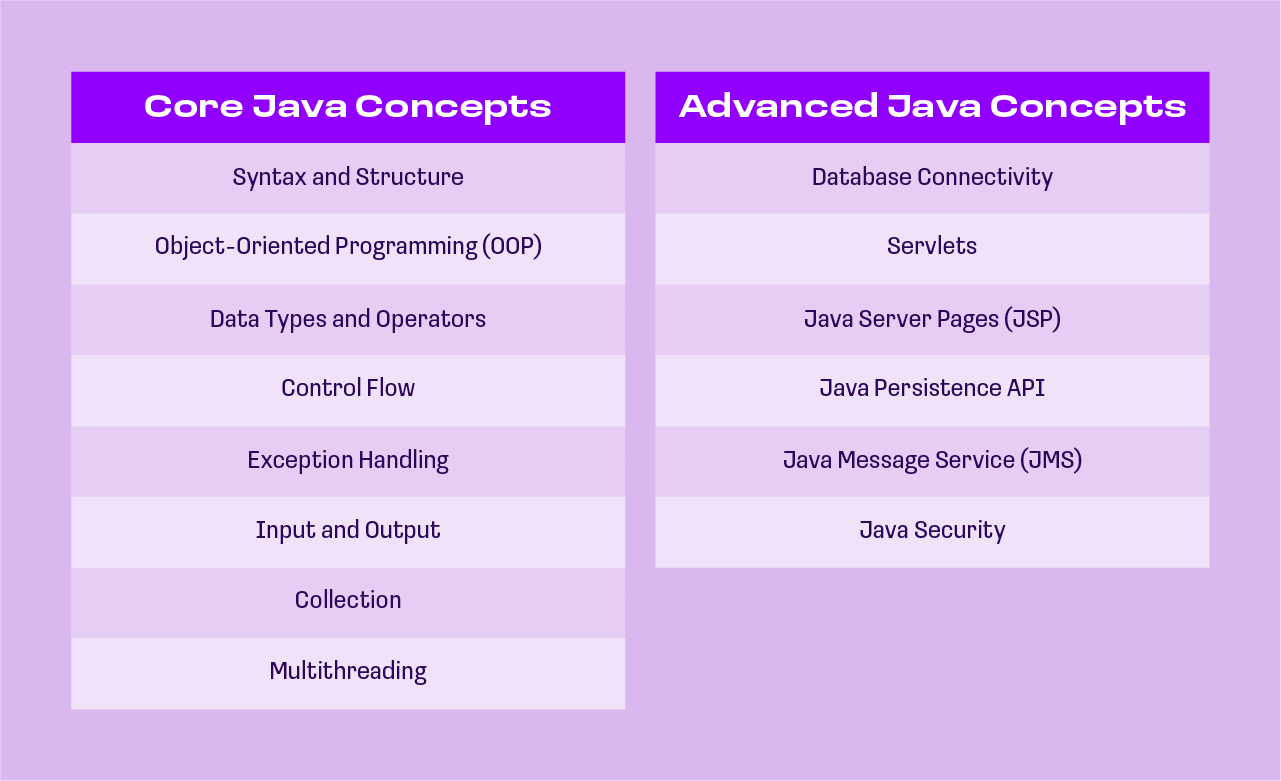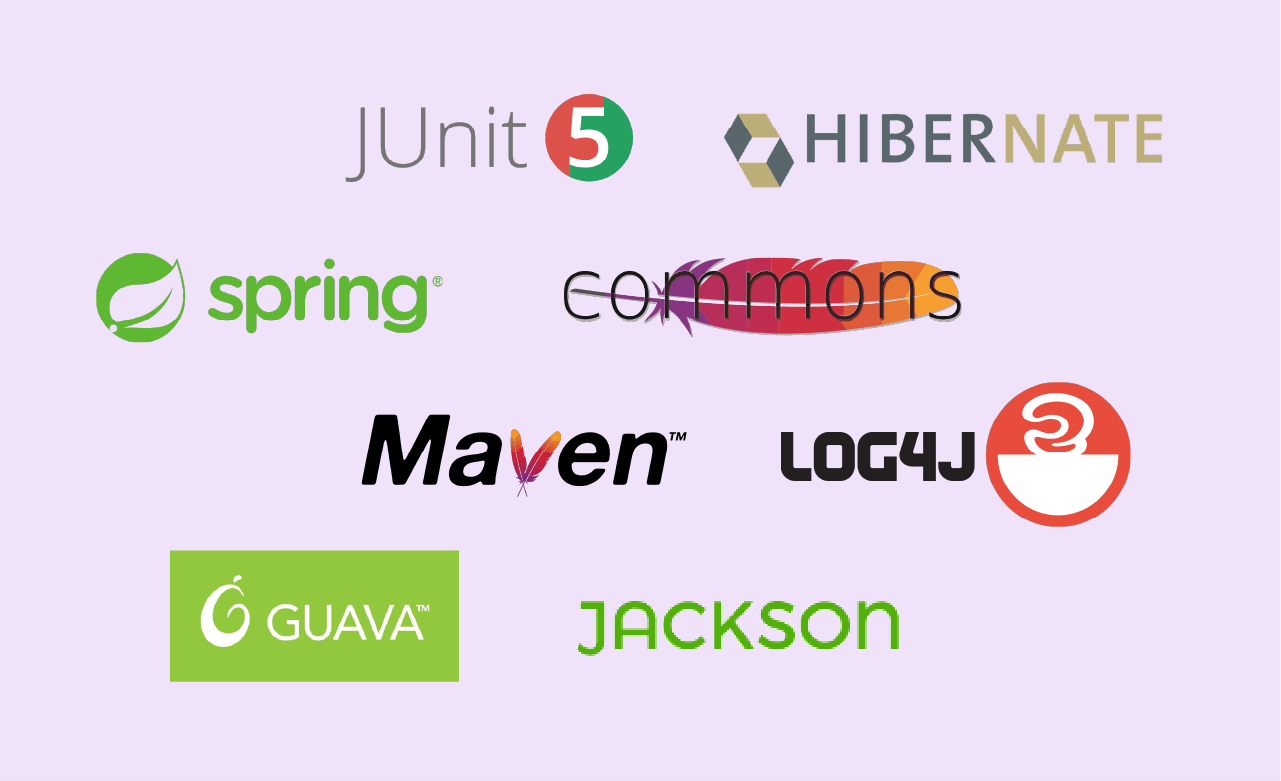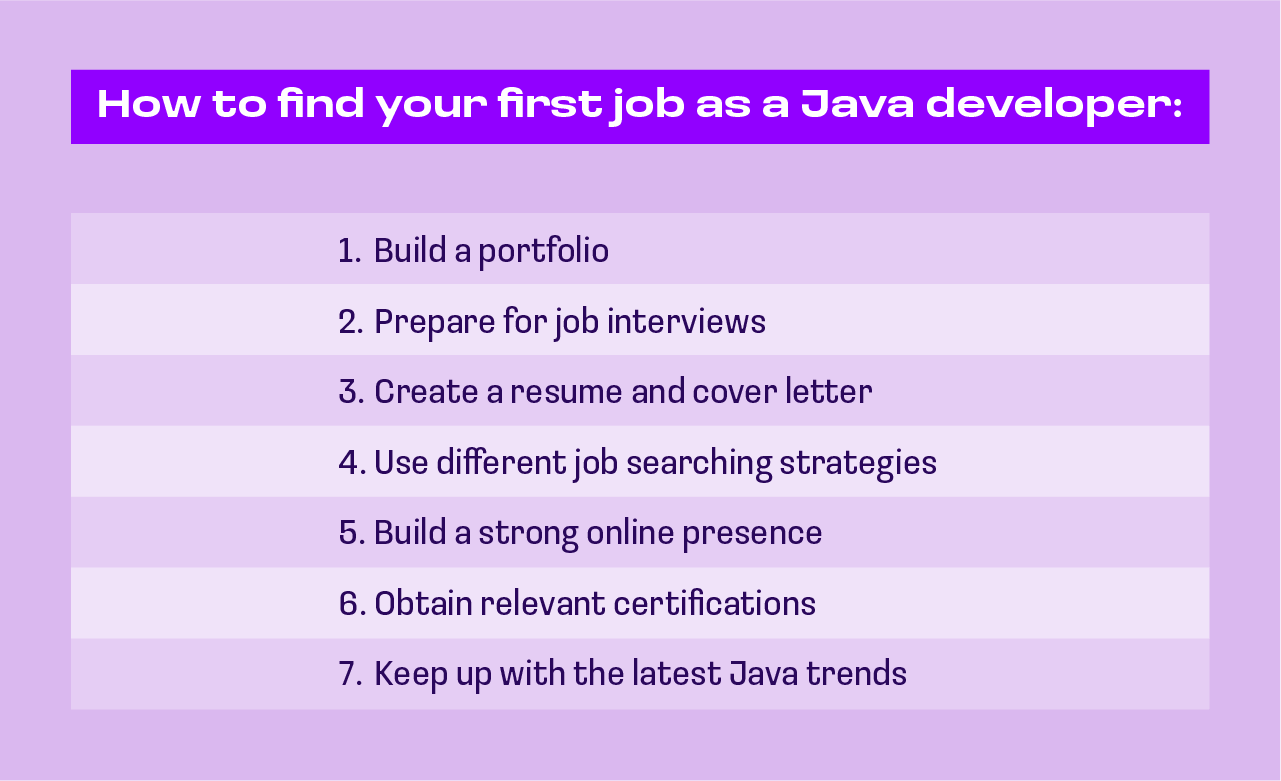How to Become a Java Developer: The Ultimate Guide
The author of this article is tech expert Pieter Murphy.

Becoming a Java programmer is more than just learning a programming language; it’s about understanding the subtleties and complexities of software development. This article is for you if you’re someone with a knack for coding or a budding programmer.
Here, we’ll discuss the reasons why Java is a good option, what to learn to become a Java developer from scratch, the concepts from the basics to advanced, libraries and frameworks, how to get your first practice, as well as numerous invaluable tips that can help you land your first Java developer job.
Why Makes Java a Good Choice?
Java is one of the most popular programming languages. It is used to produce websites and applications across multiple platforms. With it, you can be a Java software developer. It is the most preferred language for providing worldwide Internet solutions.
The language can be found in almost every application and operating system, its versatile nature and ease of use makes it a favored programming language among large and small businesses, including big tech corporations like Netflix, Google, Amazon, LinkedIn, Meta, and Amazon.
Becoming a Java expert makes you eligible for a wide range of lucrative job opportunities in the tech industry. The U.S. Bureau of Labour Statistics projects that the employment of testers, quality assurance analysts, and software developers is set to grow by 25% from 2021 to 2031, with an average of 162,900 new job openings each year over the decade.
Successfully following your Java roadmap can put you among the industry's most highly paid and in-demand professionals. According to Glassdoor, you can earn an average of $96,656 annually in the U.S.
Aside from the profession's lucrative nature, you must ask yourself: what makes this language stand out among all the other equally popular programming languages like JavaScript, Python, and PHP?
Let’s dive into the reasons:
1. Easy To Learn
Java is the most popular developing language among new developers because it is beginner-friendly. Its syntax is similar to English's, enabling you to compile, debug, write, and learn programming quickly.
2. Versatile
It follows the ‘write once and run anywhere’ principle that makes it suitable for programming applications with different platforms. It has features like dynamic coding, platform-independent characteristics, data binding, and multiple security features, making it a versatile development language.
3. Object-Oriented
Using the syntax of an object-oriented programming language enables developers to create modular programs.
4. Scalable
Java is used everywhere, including applications, mobile devices, desktops, etc. It is ideal for building applications as it can run on any operating system effectively. Its versatility and scalability make it a game-changing programming language across multiple devices and sectors.
5. Platform-Independent
Java can move easily across platforms and run similarly on different systems. Being platform-independent at the binary and source levels makes it a must-learn language for you to become a good Java developer.
6. A Rich API
Its rich Application Programming Interface (API) system comes with interfaces, packages, and classes, along with their fields and methods. This makes it possible for developers to integrate various applications and websites.
7. Open Source
Most of the language’s open-source features make application building easy and cheap. It is supported by libraries like Maven, Google Guava, Apache Commons, and JHipster, allowing developers a wide range of resources to work with.
8. Java is Free
The software can be downloaded for free on Oracle Binary Code License (BCL), allowing beginners to start using it for programming effectively and easily develop applications. It is the ideal language if you want to become Java application developer.
9. It Has A Wide Range Of Development Tools
Java has several Integrated Development Environments (IDEs). This is one of the significant reasons why it is the most sought-after programming language. Its IDEs - Eclipse, Netbeans, Android Studio, and IntelliJ - provide facilities for developing various software and applications.
10. It Provides Job Opportunities
Java development as a career is highly lucrative. It offers great job opportunities, salary packages, and, most of all, job satisfaction. In addition, you can always gain experience, add to your credentials, and progress to higher-paying job opportunities and roles.
Learn the Basics of Java
Now that we’ve discussed why you should learn the language let’s focus on how to learn it. The following is a step-by-step list of its basics in the order which is the best way to become a Java programmer, as well as what you will learn at each step:
- Creating Variables and Naming Them - You should learn the rules of naming variables.
- Creating Primitive Type Variables in Your Programs - You must understand the syntax of creating and initializing primitive type variables.
- Creating Arrays in Your Programs - You should learn how to create fixed-length containers of objects with arrays.
- Using the Var Type Identifier - You should know how to define variables with Var.
- Using Operators in Your Programs - Here, you’ll learn how to compute things with operators.
- Summary of Operators - You’ll wrap up with Java operators at this stage.
- Expressions, Statements, and Blocks - Here, you’ll learn expressions, statements, and blocks and how to group statements into blocks.
- Control Flow Statements - You’ll learn looping and branching statements supported by the Java programming language.
- Branching with Switch Statements - You’ll learn how to use statements to control your program's flow at this level.
- Branching with Switch Expressions - The final step in learning the basics is knowing how to extend the switch to use it as either an expression or a statement.

Understand Core Java Concepts
The best way to become a Java programmer is to learn Core Java. The term refers to the foundational building block upon which all Java programming is based. The following are the key concepts you need to understand:
1. Syntax and Structure
Core Java introduces beginners to the syntax and structure of the language, from defining variables to writing organized and clean code.
2. Object-Oriented Programming (OOP)
It provides a solid foundation in OOP concepts like classes, objects, and polymorphism.
3. Data Types and Operators
Understanding operators and data types like primitives and objects is pivotal in Core Java. To be a Java programmer, you must know this to perform operations and calculations.
4. Control Flow
Control structures such as conditional statements and loops make it possible to create dynamic programs.
5. Exception Handling
Learning the foundational aspects will teach you the principles of exception handling and how to deal with errors.
6. Input and Output
You will be taken through techniques for writing to and reading from the console, files, and other sources.
7. Collection
To manage and manipulate data efficiently, you must understand collections such as sets, lists, queues, and maps.
8. Multithreading
Learning to multithread will make you competent enough to create programs that will do multiple tasks concurrently, which is needed to build efficient and responsive applications.
Understand Advanced Java Concepts
Becoming an advanced Java programmer requires extra knowledge. Advanced Java is a collection of tools and technologies that enable programmers to create secure and dynamic applications. Before learning it, you will need a strong foundation.
The following are some of the key requirements:
- Core Java Proficiency
- Web Development Basics
- Database Fundamentals
- Standard Libraries
- Basic Programming Logic
- Understanding of Networking
Some of the Advanced concepts you’ll need to understand to become a good coder in Java include:
- Database Connectivity: This is a standard API for database access.
- Servlets: This is used in the creation of web applications.
- Java Server Pages (JSP): You must understand this concept to create dynamic web content.
- Java Persistence API (API): This is a specification for persisting objects into databases using Object-Relational Mapping (ORM).
- Java Message Service (JMS): This concept will enable asynchronous communication between components.
- Java Security: This concept encompasses authorization and authentication to ensure application security.
With advanced knowledge, you can even consider switching roles to become a Java Architect, managing entire projects, or take on adjacent roles that offer more opportunities and challenges.
Learn Top Java Libraries and Frameworks

One of the things that makes the language popular is its vast ecosystem of frameworks and libraries that accelerate and simplify the development process.
These frameworks and libraries give developers pre-built functionalities that save effort and time, thus promoting code reusability. The following are some of the essential libraries and frameworks that you’ll need to be aware of before you become a successful Java developer:
1. Spring Framework
This is arguably the most popular framework for enterprise-level application development. It provides a comprehensive environment covering nearly every aspect of development.
2. Hibernate
Hibernate is an ORM library that makes database interactions in applications simple. It lets developers map objects to database tables, making it easier to manipulate, retrieve, and store data without needing to write native SQL queries.
3. Apache Maven
Apache Maven is a powerful project management and build automation tool that is used in projects extensively. It will prove instrumental if you want to be a Java software engineer. It provides a straightforward way of managing builds, defining dependencies, and executing various development lifecycle phases.
4. Guava
Google developed Guava, a collection of Java programming's helper functions and utility classes. These are important when you want to become a Java software engineer. It complements the Standard Library by providing additional functionalities like concurrency, caching, collections, and I/O (input/output).
5. JUnit
JUnit is a testing framework for applications made in Java. It lets developers write and execute unit tests to check and ensure the correctness of their code.
6. Apache Commons
Apache Commons, developed by Apache Software Foundation, is a collection of reusable Java components. It has various utilities, including mathematical functions, configuration management, file I/O, and more.
7. Log4j
Log4j is a flexible and reliable logging library for Java apps. Logging is crucial in software development for diagnosing issues and tracking application behavior.
8. Jackson
Jackson is a high-performance JavaScript Object Notation (JSON) processing library for Java. It provides functionalities to parse objects into JSON and vice versa.
Learn Java Build Automation Tools
To become a professional Java programmer, you must be familiar with build automation tools. After understanding each tool's features, pros, and cons, you can explore and experiment with different tools to find one that best fits your project needs.
Here are five of the most popular build automation tools:
1. Maven
Apache Maven is among many developers' most popular go-to build tools. It simplifies the building process by first defining a project’s dependencies and how it is built through an XML file.
2. Gradle
Gradle leverages the foundational principles of Apache Maven and Ant. It is an open-source tool for build automation that delivers exceptional adaptability and performance through its DSL grounded in Groovy.
3. Apache Ant
Apache Ant is the most popular automation tool for developers working with the language. It uses a step-by-step workflow to manage the tasks defined in build files.
4. SBT (Simple Built Tool)
SBT is used primarily for Scala projects, it is also compatible with Java and is popular because of its interactive console and high build performance that make the development process easier.
5. Leiningen
Although it is mostly used for Clojure projects, Leningen can also handle Java project builds effectively. It offers straightforward project management and setup capabilities.
Learn Java GUI Tools
GUI tools will be instrumental in your journey of becoming a Java developer, especially when you want to build a solid foundation and move fast with your software development tasks. Some of the common ones are:
1. JavaFX
This is a modern, rich client platform for building cross-platform applications in Java. It gives you access to graphics and medic packages that you can leverage to design, build, test, edit, and deploy rich client apps optimized for different platforms. These are needed to become proficient in Java.
2. Java Swing
Another GUI toolkit for Java is Swing. It is part of the Java Foundation Classes (JFC) and provides a set of components for building desktop applications.
3. Standard Widget Toolkit (SWT)
Learning this tool will help you become a Java engineer as you’ll build native-looking user interfaces. It has impressive UI components and APIs, enabling developers to build platform-independent graphical applications.
4. Google Web Toolkit (GWT)
This tool lets you learn how to be a Java developer. With it, developers can create complex and highly interactive web applications.
Get Your First Java Development Practice
After learning everything you need to know about the language, it is now time to become a professional Java programmer by working on practical projects such as:
1. Simple Application Ideas
To reinforce your skills, you can develop basic applications like a calculator, a to-do list manager, or a simple text editor.
2. Applications with Database Ideas
With your hard-earned knowledge, you can build applications that interact with databases, such as a library management system or a personal finance tracker.
3. Web Development Ideas
Another way to become a Java web developer is by acquiring real development practice by exploring web development with projects like a blog platform, an e-commerce site, or a content management system using frameworks like Spring Boot.
4. Open Source Contributions
You can also contribute to open-source projects on platforms like GitHub to gain real-world experience and collaborate with other developers.
Learn How to Write Clean and Efficient Code in Java
The most significant of the things to learn to become a Java developer is coding. You should embrace learning how to write clean and efficient code as early as possible, here’s how:
1. Code Formatting
Practicing consistent code formatting enhances readability and maintainability. To be a Java expert, you can use tools like Checkstyle or IntelliJ IDEA's built-in formatting function.
2. Code Comments
You should document your code effectively with meaningful comments to aid understanding and future maintenance.
3. Code Optimization Techniques
You should familiarize yourself with various techniques for optimizing code performance, like efficient algorithms and data structures.
Learn Design Patterns in Java
Learning how to be a Java developer involves knowing design. Familiarizing yourself with design patterns can help you solve common problems that will arise as you design software. Popular designs include:
- Creational Patterns: Examples of these patterns include Singleton, Factory, and Builder patterns.
- Structural Patterns: You should explore Adapter, Decorator, and Composite patterns.
- Behavioral Patterns: Learning and understanding patterns such as Observer, Strategy, and Command patterns is advisable.
Learn Version Control with Git
One of the steps to become a Java developer is mastering version control with Git. It is essential for collaborative software development. You should understand how to use Git to track changes, manage branches, and collaborate with other developers.
Understand the Software Development Lifecycle
You should gain an understanding of the software development lifecycle. This includes requirements analysis, design, implementation, testing, and maintenance. This knowledge will help you work effectively in a professional software development environment.
Learn Effective Debugging and Testing of Java Applications
The best way to become a Java developer is to acquire skills in debugging and testing Java applications to ensure their reliability and quality. Familiarize yourself with debugging tools and testing frameworks such as JUnit, TestNG, and IntelliJ IDEA Debugger.
Build a Portfolio
As you gain experience and complete projects, you should build a portfolio showcasing your development skills with the language. A strong portfolio can significantly enhance your prospects for employment as a developer.
Find Your First Java Developer Job
Here’s a breakdown of the quickest way to find your first job as a developer:

Prepare for Job Interviews
Ensure you have a strong grasp of the fundamentals and related technologies commonly used in the industry. Be prepared to showcase your coding skills, problem-solving abilities, and understanding of data structures and algorithms.
You can also familiarize yourself with common interview questions and participate in mock interviews.
Create a Resume and Cover Letter
You should tailor your resume to highlight your outstanding skills and quantify your achievements. Craft a personalized cover letter focusing on passion and alignment.
Job Searching Strategies
Using online job boards, networking events, and company websites is a good idea. You should set up alerts, attend meetups, and update your LinkedIn profile.
Build a Strong Online Presence
Try your best to maintain an active GitHub profile with well-documented projects. Make the most of LinkedIn, focusing on skills and industry connections.
Continuous Learning and Certifications
You should stay updated on the trends through blogs and online communities. Consider obtaining relevant certifications, like Oracle Certified Professional.
Keep Up with the Latest Java Trends and Updates
To become a successful Java developer, it is important to stay updated with the latest trends, best practices, and new features.
You can follow reputable and relevant blogs, attend industry events, and participate in relevant online communities to stay informed and continuously improve your skills.
Conclusion
After going through all the steps necessary to become a professional Java developer from scratch and build a career in development, becoming a proficient programmer requires continuous learning, practical experience, and serious dedication.
The foundational preparation and subsequent experience can in making a career switch for Java developers down the line, presenting even more opportunities beyond what Java proficiency offers.
Use the information in this article as a checklist and guide that will help you stay committed to your professional journey. You, too, can become a successful developer specializing in the language. All the best!


.png)
